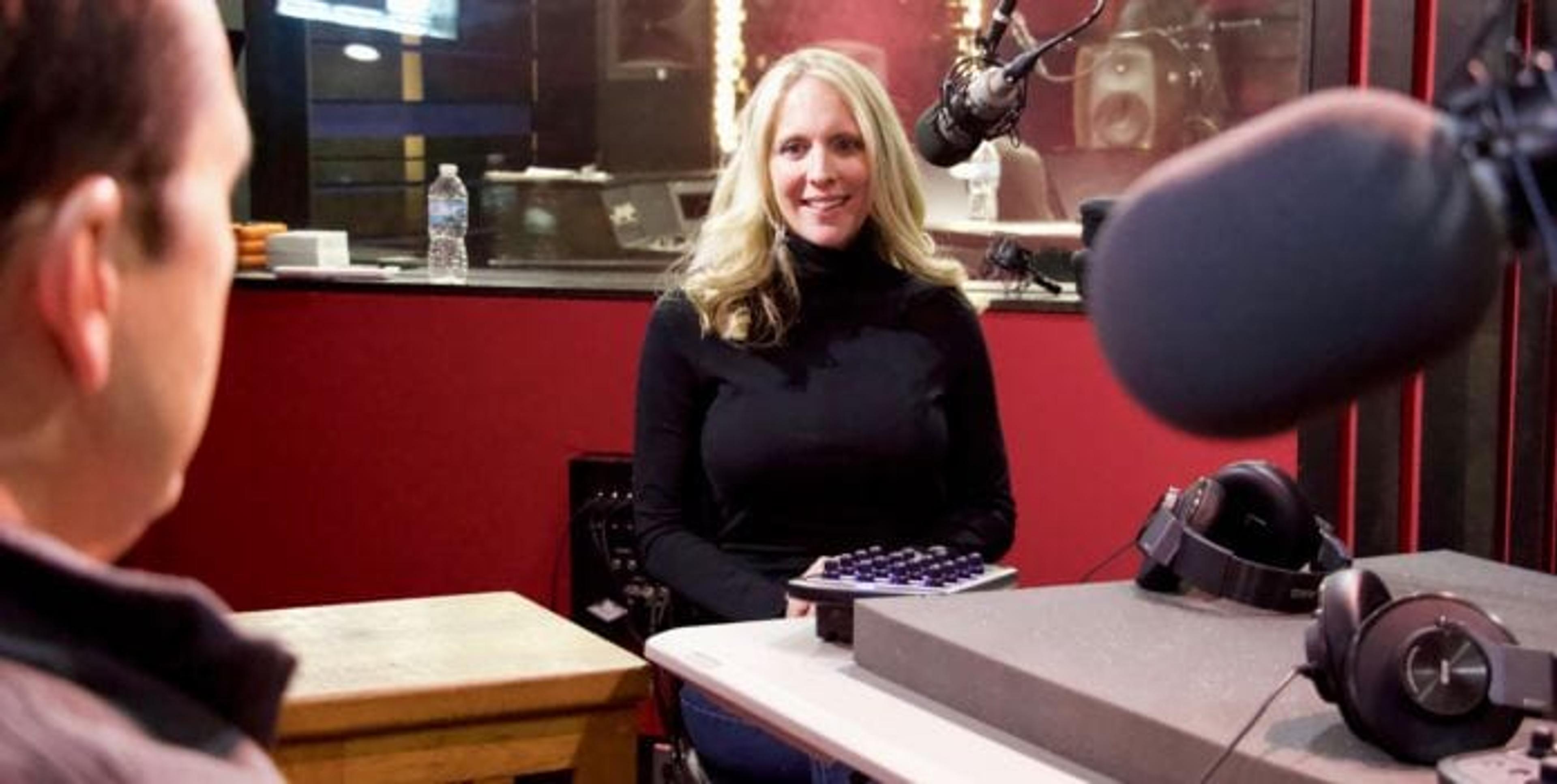Kick Off to a Healthy New Year
| 1 min read

00:00
00:00
About the Show
On this episode, Chuck Gaidica welcomes registered dietitian Susan Okonkowski to discuss healthier ways to approach nutrition in the new year.
“There isn’t one silver bullet that’s going to work for everyone. That’s the hard part, because the one silver bullet that everybody’s looking for is, ‘Can I have this particular diet?’ Which no, that’s not going to work. But what you can do is cut down on sugar. Added sugars are a huge culprit.” – Susan Okonkowski
In this episode of A Healthier Michigan Podcast, we explore:
- The stigma of dieting
- Individualized nutrition plans
- How to seek balance, not restriction
- Eating well versus working out
- The importance of meal planning
- Utilizing tools and resources for accountability
Transcript
Here is the full transcript of this episode. You can listen to the audio version on streaming platforms or watch on YouTube.
Chuck: This is A Healthier Michigan Podcast, episode 19. Happy New Year by the way. Coming up, we discuss a better way to look at resolutions and nutrition. That’s a good idea.
Chuck: Welcome back to A Healthier Michigan Podcast. This is the podcast dedicated to navigating how we can improve our health and well-being through very small, sometimes healthy habits that we can start implementing right now. We want to give you takeaways throughout the next several minutes so you can actually get going a head-start on the new year. I’m your host, Chuck Gaidica. Every other week we’re going to sit down with a certified health expert from Blue Cross Blue Shield of Michigan and do a deep dive into topics covering nutrition, fitness, and so much more. On this episode, we’re talking about how to bring balance to your eating plan for the New Year of 2019. With me right now is Susan Okonkowski. Good to see you.
Susan: Good to see you, Chuck. Thank you.
Chuck: You have got so much going on. I mean, you’ve got kids. You’ve got a newer child and a family, right? She or he? I’m sorry again.
Susan: He.
Chuck: He is keeping you busy, right?
Susan: Very busy. Yeah, he’s a little busy four month old.
Chuck: That’s a good plan to work off calories right there, right?
Susan: It is.
Chuck: Well, let me tell you a little bit about Susan. She’s a healthcare manager at Blue Cross Blue Shield of Michigan with over 15 years of experience working in health and well-being. She’s got a master’s degree in public health from the University of Michigan, a bachelor’s in dietetics from the University of Wisconsin, and she’s also a licensed and registered dietitian. She’s been teaching as an adjunct faculty member in nutrition and health sciences at Washtenaw Community College for, I guess it’s 12 years plus and also at Madonna University. She’s here, married to an entrepreneurial husband, two kids keeping her busy and wants to let everybody know we should take that word diet and just throw it out for the new year. Is that right?
Susan: We should.
Chuck: Why?
Susan: Diet just has this negative connotation to it because you never really want to be on a diet. It’s more you want to create sustainable lifelong habits for an eating plan versus, “I’m on a diet today and then next week I’m not.”
Chuck: We’ve got a new year and we know that this is the place of recalibration, right? Everybody makes some kind of resolution, whether it’s overt, whether we keep them, whether we break them within two weeks. How do we really get started on something? I don’t want to call them baby steps, but how do we do something that’s manageable so we really can see success?
Susan: The biggest thing first of all is just set a goal. Think about what it is that you want for yourself for the year when it comes to eating and nutrition. Once you’ve figured out what that goal is, think about how you can attain that. We can talk about today all the different kinds of ways and tools that are out there for you to use to make sure that you are eating healthfully and cooking healthfully for yourself and your family.
Chuck: You’re mentioning yourself and your family, but I know you’re a big fan of this idea that nutrition is individual. While we can make a plan and we have to, you’ve got two kids. We have five that grew up in our household. You’ve got to manage all of that stuff, shop and all the rest, but this is still an individual thing because your own metabolic rate, everything is different. We’re all individual.
Susan: It is. It absolutely is, and that’s the thing when people say, “Well, you know, I’m going to go on this kind of diet.” I’ll just say, “The keto diet is really big right now.” “I’m going to go on the keto Diet. My friend is doing this,” but unfortunately your friend might be 200 pounds and I’m 150 pounds. That is a very different nutrition plan for each one of those individuals and it all depends upon what is it that you’re trying to do. Do you want to fit in your clothes better? Do you want to run a marathon? Do you want to lift more weights? Do you want to just lose weight so you can chase your kids around a little bit easier. There is no one size fits all approach in this eating plan.
Chuck: If you find one of those plans that’s working for you, conversely, that may not be the best plan for the rest of your family either. Right?
Susan: That’s right. That’s where it becomes a little bit tricky, so it does get a little bit easier when you do meal planning and all those kinds of things for your family and especially with kids in the mix. They need to see you role model and eat healthy things too.
Chuck: I have to admit to you, I can never imagine a day where I wouldn’t see bananas in my kitchen and there was a day where I would think that was so evil, too much sugar, it’s fruit, it just doesn’t fit into the plan. How do we recalibrate with this new year, how do we recalibrate our minds into thinking that balance is good for our lifestyle change?
Susan: The biggest thing to think about is you have to balance everything between carbohydrates, fats, and protein, and for such a long time over the past decade it’s been, carbohydrates are bad, carbohydrates are bad, but essentially they’re fueling your brain. That is fuel for your brain to do everything you need to do for the day, so mixing that in with a good amount of protein and a little bit of fat because you don’t want to have too much fat, will help you set up success for the entire day.
Chuck: Is there any kind of magical number that we’re looking for because you know, I mean people could be listening to this as they’re on a jog or a walk right now, right? I don’t want everybody to have to do too much math, but when you say balanced carbs, protein, fat, how do we do that so we intuitively start to know that’s a good day and that’s been a good week for us?
Susan: Optimally, everyone has their own separate what’s called basal metabolic rate. I burn calories very differently than my husband would and than you would and your wife would. If you sit down, you can actually go through the calculations to figure that out, but it can get a little complicated. An easier way to look at it is if you think at each meal, so each small meal that you’re going to have, you’re going to have a serving of carbohydrates, you’re going to have a serving of protein and then just a small amount of fat. In the morning that would look something like, I’m going to have oatmeal and I’m going to mix in a tablespoon or two of peanut butter.
Chuck: Got you.
Susan: Then I’m going to throw in maybe a few sprinkling of some bananas or some dried cranberries. Not too many, but just a couple. Then now all of a sudden you have this mix of carbs, protein and fat without really having to think about, okay, how many calories is that or how many grams of carbohydrate or fat and protein because it gets complicated.
Chuck: When we go off the reservation though, and we lose that balance because sometimes you know, in your life it’s busy. Maybe it’s a business launch or something else. Can we just compensate at the other meal like at dinner time if we had a lunch that took us out? I know we can make healthy choices, but through the day you’re saying try to find that balance in each individual meal. Right?
Susan: Yup, and you can. I mean, let’s say you had a little bit of a heavier lunch cause you were out for a business lunch. At dinner then maybe you have just a really nice salad and you add a little bit of a grilled chicken breast on there so you’re not having as much carbohydrate as you had at lunch. Maybe the bread looked pretty delectable, so you’re like, “I’m going to try that piece of bread for lunch.” You can balance it out throughout the day. The biggest thing though that I say is always, always try to have a vegetable at two out of your three meals or if you’re eating smaller meals, have a vegetable at four out of those six meals because that’s going to ultimately help to balance in those carbs, protein and fat.
Chuck: Do you have any view on where the protein should be coming from? Should we care based on your advice, whether it comes from animal protein or it comes from black beans, is there a better source that’s better for us?
Susan: The trouble in saying is there a better source is that since everyone is so individualized, some people might be vegan, some people might not have animal protein because of religious reasons.
Chuck: Sure.
Susan: Ultimately I say, try to pick proteins that are healthier, like lean proteins, chicken breast. If you are eating meats, lentils, beans, those are all really, really good sources. Always try to get them from food first before going to supplements.
Chuck: If I’m looking at creating this new year plan, is it better for me to focus on what I’m eating or how I’m working out? Where am I going to see the results?
Susan: You’re going to see the results way more with eating than you are working out.
Chuck: No question.
Susan: Yeah, there is no question. You can’t outrun your fork.
Chuck: Okay, so I can’t outrun my fork so I can eat like a banshee through the day and then go jog five miles. You’re saying that won’t balance itself out?
Susan: No, unfortunately not.
Chuck: Come on.
Susan: We all wish it could, right?
Chuck: Yeah, but if you do have a specific goal, like you were saying, if you wanted to look better, you’re going on a cruise in March, then you say, that’s my goal. If you’re looking to lift a few more weights or something, you may add a little protein. Again, this is the way you could bring adjustments to the lifestyle.
Susan: That’s exactly right. If you want to, there is that balance of if I’m going to train for something like a marathon, which I love running, that’s my passion, I’m going to bump up my carbs a little bit because I know I’m going to use a little bit more of that kind of energy. If you are weightlifting, you can bump up your protein a little bit, so there are those individual differences that can be done.
Chuck: As we try to give ourselves these goals, is there something else we can do? Because I will just tell you my own particular story, we started to reveal some of this in our previous episodes. I started being accountable to an app on my phone. I wasn’t being accountable to my spouse, I wasn’t being accountable to my kids. I was logging my food and when I see it, and then of course it gets a bit technical. If you’re a nerd like I am now, I may have been trained to look at it. I’m looking for fat content, salt, all kinds of stuff, but I never really thought I would start to see flags of things that I thought, oh man, having Oreo cookies and 2% milk really isn’t going to be a balanced snack, you know.
Susan: Yeah. It is really important when you are going through this, what I call journey to a better you essentially. Especially with nutrition, it does help to have some accountability and there are all kinds of tools and resources out there that you can use. Apps for shopping lists. I know this is something that my husband and I use all the time. There are apps for tracking your foods, tracking your exercise. All of those tools are going to help you reach your goal and essentially it doesn’t really take that long to use them either, and it helps you become more successful along the way. Because oftentimes people don’t think about the fact that, “I go to the grocery store and I’m going to pick up 10 things, but I’m hungry because I’m running right after work before I get the kids.” They’ll throw probably five or six things in their cart that they don’t really need, but if they have that list sometimes, they’re like, “Okay, I’m going to stick to the list.” Just all those different tools out there are really helpful, like you said, to help keep you and your family accountable.
Chuck: Let’s expand on this idea of your shopping list because you’re big at meal planning for you and the family. We’ve talked a little bit about the individuality, but you know, you’ve got two kids, your husband, you’re both going to be shopping maybe together individually. Give us an idea of what you mean by meal planning so we can stick to this resolution.
Susan: One of the biggest things, and I’ve always said this along the way, we know in teaching and when people ask questions about how can I be successful, preparation is key, right? Planning, because when you don’t plan, you don’t prepare, you set yourself up for failure. Especially with meal planning, if you sit down even once a week on the weekend when you might have some more time or if you work in the weekend, do it during the week. You can set out like, okay, I’m going to plan three or four meals at a time. Doesn’t have to be everything for the week, but as long as you set out and you say, okay, we’re going to have fish one night with a vegetable and some rice. Then in the next night we’re going to have grilled chicken. Then you add everything into your shopping list. You go get that on Sunday and then you can even start to prep certain things on Sunday or Monday. Oftentimes if you are working during the week, especially with families, you get busy and it gets hard to come home in the evening and all of a sudden you have to make dinner and the kids needs help. The more you can set yourself up for success early on and especially knowing what you’re going to have, the better it’s going to be.
Chuck: You know what’s easier for me to think about when you’re talking about this balance of protein and carbs and fats is if you’re looking for those five or six protein shots in the week, it would seem like it makes your shopping a little simpler.
Susan: It does, it absolutely does. You think about like one night I’m going to have a vegetarian meal and the protein from that is going to be a non-animal source. On the next night, okay, if you do choose to eat animal proteins, you pick a lean chicken breast or the next night you can pick a lean ground turkey. Then your meal kind of flows around that particular protein source versus we’re going to have this huge pasta dish which you can, but oftentimes if you start out with that carbohydrate source, it tends to lack the protein and fat because you really focused on the carbohydrate source.
Chuck: I’ve noticed in the past when I was experimenting with this diet, this diet, this diet, if I went too protein heavy, I would get a little fuzzy. Is that the lack of carbs? Is that what you were talking about?
Susan: That’s exactly what’s happening.
Chuck: If you’re not balanced it can actually affect other parts of your day that you may not be expecting.
Susan: Uh-huh (affirmative). You start to feel foggy because your brain runs from carbohydrates. Glucose from carbohydrates is the main function to your brain. That’s why they were saying, kids need to eat breakfast. They go to school, they need that glucose to start their day and everyone does. I mean it helps out a lot.
Chuck: I know if I were listening to this podcast that I would be asking, well, what’s the silver bullet? Everybody wants to know what’s the new drug for a diet? What’s this thing? Of course, the word diet, you want to throw it out. A lot of other people do too. Is there a silver bullet in terms of raising our metabolic rate? Is there anything that we can do that can actually influence what’s happening inside us? Not just what we’re ingesting.
Susan: One of the big things, if you’re looking for the silver bullet, there isn’t one for-
Chuck: Come on, Susan. I just was hoping.
Susan: There isn’t one silver bullet that’s going to work for everyone. That’s the hard part because the one silver bullet that everybody’s looking for is, can I have this particular diet? Which no, that’s not going to work, but what you can do is cut down on sugar. Added sugars are a huge culprit.
Chuck: Hidden, sometimes.
Susan: Yes, very much so. I always say, look at added sugars and they’re everywhere. I mean, they’re in crackers, they’re in things that you just not expect.
Chuck: Salad dressing. Right?
Susan: Yes, very much so. Look for saturated fats, I mean, really try to limit saturated fats. Then also, another culprit is sodium like we’re talking about earlier, sodium is one of those things that causes people to retain a lot of water and it’s not going to help your long term goal.
Chuck: We’ve discovered as a family, our son is gluten intolerant and it’s not just a lifestyle thing to be hip, right? He’s got a thing that led him on this path. We start buying foods that are gluten free and the other kids are fine. You know, we did stuffing at Thanksgiving that was gluten free, but if you start to look at the packaging and because they’re using rice flour and they’re putting in sugar and sometimes fats even into the cookies to try to make that palatable to our taste buds, I’m finding tons of hidden sugar. You’ve got to be careful even as you’re going gluten free.
Susan: Very much so, even with all the other allergies that are out there, they take something out and then they replace it with something else. Not always is it a good item. One of the things always to think about too is fresh foods, fresh foods are going to help you meet your goal because you’re going to have more vegetables, you’re going to have more lean sources of protein. That long term is so much better than, “I’m going to be on this particular diet.”
Chuck: Uh-huh (affirmative). Somebody is almost at three miles jogging right now and they’re getting to the end of the road here. Give me a takeaway. What are we supposed to take away from this podcast of things that are real that we can really start as we kick into January?
Susan: One of the first things is think about what you are going to eat. Be that intuitive eater. Plan. Plan for what it is that you are going to consume throughout the day. Have your snacks ready. Have your meals ready. Use all of those tools around you that are in your resource area. Use those apps that are on your phone to meal plan, use the shopping list, have your kids if they’re old enough, get involved. That’s another thing that I think is people oftentimes don’t get their kids involved with it and it’s fun. My daughter loves to be involved with picking out different foods and she loves her salmon and her quinoa and it’s funny because it’s just something that I’ve been involved her with from the get-go.
Chuck: “Hey mom, I really would like peanut butter with my apple.” That’d be nice to hear. Right?
Susan: Yeah.
Chuck: It just dawned to me, we’re going about 20 minutes here, but if somebody is actually doing three miles, that’s a pretty good pace. Maybe it’s only two miles. I’ve got a guy jogging for me right now, so it’s okay. Susan Okonkowski has been with us. It’s been delightful meeting you, talking with you and you’ve encouraged me for this new year because we’re all trying to recalibrate with maybe a lifestyle change that can help us. For me, it’s to look better in the bikini. That’s what it’s all about. We want to tell you, by the way, I forgot to mention this at the top, we have a newsletter for you. If you go to ahealthiermichigan.org, you can get some great tips delivered right to your mailbox all the time. That’s a good way to keep in touch. Also, we are now putting this podcast out in various places, including Spotify, iTunes and Stitcher.
Chuck: If you subscribe on iTunes, we would ask you, could you rate us on iTunes so we can find out what you’re thinking. You can check out all of the episodes, the new ones for the new year, previous as well at ahealthiermichigan.org/podcast. I’m Chuck Gaidica with Susan Okonkowski. Thanks for being with us. We’ll see you next time.





